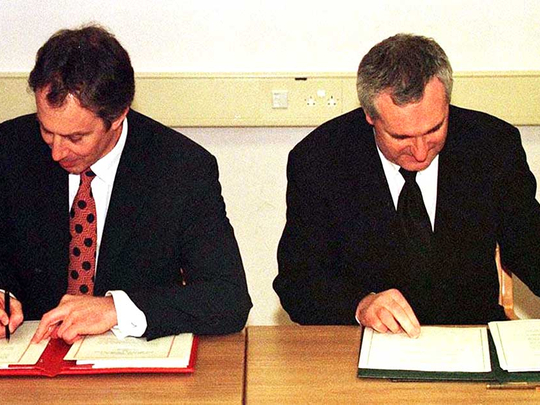
Almost exactly 20 years ago, after months of delicate and difficult negotiation, leaders of Northern Ireland’s two main political camps — Catholic nationalists and republicans on one side; Protestant unionists on the other — signed the Good Friday Agreement, ending more than 30 years of violence and bloodshed. Now, that agreement — and the mutually respectful and harmonious relationship that it enabled — is under threat.
The Good Friday Agreement was brokered by the prime ministers of the United Kingdom and the Republic of Ireland — Tony Blair and Bertie Ahern, respectively — with the help of United States Senator George Mitchell. (A great deal of spadework had also been done by Blair’s predecessor, John Major.) It was based on the proposition that, as long as everyone agreed that changes to Northern Ireland’s constitutional status could come only as a result of free democratic choice, people could assert their loyalty to their preferred identity: British, Irish, or even both.
To support peace, the agreement created a power-sharing government in Northern Ireland, with representatives from both sides of the conflict. It also established the Independent Commission on Policing for Northern Ireland to reform the police service. The efforts helped reduce attacks on the police, and led to a substantial increase in the recruitment of Catholics, among other things.
Once the agreement was signed, the status of both Britain and Ireland as European Union members made the transition incomparably easier. Just like that, the border between them was little more than a line on the map: there were no barriers, customs posts, or other divisive symbols to show where one country ended and the other began. Trade and people could move freely between them.
In fact, their status as European partners — ever since Ireland became a member of the European Communities in 1973 — has long reinforced the ties binding the UK and Ireland. To be sure, their violent history — which has included conquest, colonisation, rebellion, and famine — has left deep-seated animosity. Yet, as European partners, not to mention neighbours in an archipelago off the west coast of Europe, they are inextricably connected. More than five million people in England, Wales, and Scotland have at least one Irish grandparent. Go back a generation further, and the number rises higher.
Over the last two decades, the UK and Ireland have enjoyed the fruits of a mutually respectful and peaceful relationship. There is certainly much for us British to admire in Ireland today: its economic growth, its cultural renaissance in literature and music, its appeal to immigrants from around the world, who now comprise 17 per cent of the country’s population. With extraordinary maturity, Ireland has left behind narrow clericalism, and become a modern and generous state.
Yet serious challenges are now emerging. In Northern Ireland, the power-sharing government has broken down, and the UK government is not in a strong position to help restore constructive collaboration. In order to secure a working majority in the House of Commons after last year’s disastrous snap election, British Prime Minister Theresa May’s Conservatives made a deal with Northern Ireland’s Democratic Unionist party, which has its roots in the more extreme unionist traditions. As a result, the UK government seems unable to act as an even-handed mediator.
The ongoing Brexit negotiations are complicating matters further, as nobody seems to know how to deal with the consequences for Northern Ireland and the Irish Republic, which will be divided by the UK’s border with the EU. While many politicians say they want a frictionless border, May and some of her colleagues have discussed leaving both the single market and the customs union, thereby putting the UK outside the tariff-free zone in which trade is facilitated by shared regulations. Northern Ireland, they assert, will have to have the same trade rules as the rest of the UK.
This leaves two possibilities: either a frictionless trade regime that operates throughout the British Isles, or a hard border across Ireland. After all, other EU countries are not going to allow only England, Scotland, and Wales to leave the single market and customs union, while leaving Northern Ireland in. That would make it far too easy to avoid regulations, such as rules of origin, with a non-EU country exporting goods to Ireland for onward shipment to the UK, or vice versa. Similar problems arise with regard to the free movement of people within the EU — a rule to which the UK does not want to be subject.
None of these challenges should come as a surprise. The warnings were issued a long time ago; the British government simply ignored them. Potential solutions remain a mystery, but the authorities will have to confront the question sooner or later.
There is certainly no easy technological solution. Any system of checks will inevitably involve some sort of physical control. The customs officers tasked with implementing those checks will inevitably become symbols of division, and potentially even a provocation to violence by republican extremists, as happened in the past. All it would take would be one attack to impel the government to boost security, deepening divisions and spurring more violence.
The reintroduction of a hard border in Ireland would be devastating, as it could undermine the Good Friday Agreement. One hopes that Irish leaders can impress this upon politicians in the UK, opening the way for a solution that doesn’t threaten Ireland’s hard-won peace and prosperity.
— Project Syndicate, 2018
Chris Patten, the last British governor of Hong Kong and a former EU commissioner for external affairs, is Chancellor of the University of Oxford.










